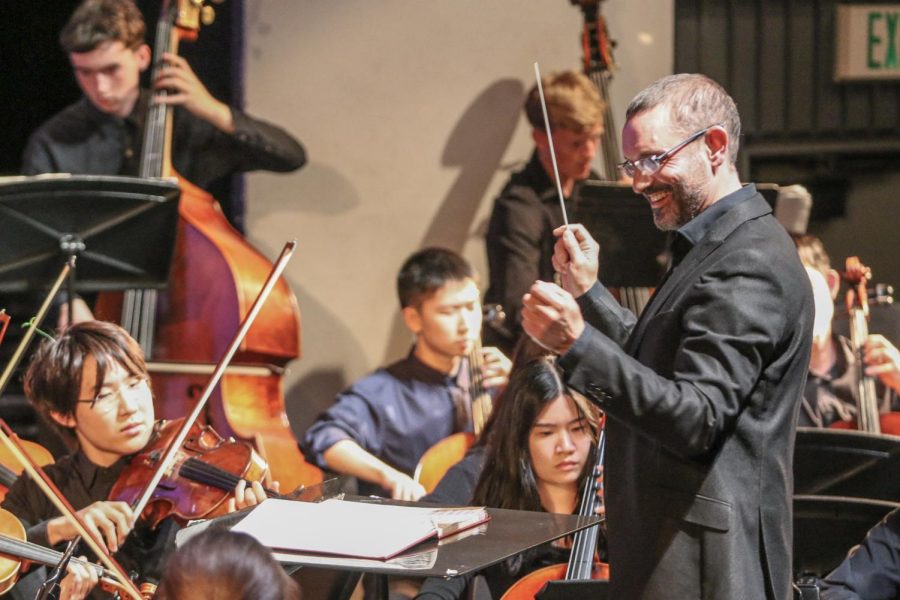Departing Arts Director Mr. Krus Speaks On His Groundbreaking Career
Andrew Krus is a veritable icon of the Lakeside art department, and for good reason. He’s been at the school for almost 18 years, and in that time has completely changed the Lakeside music scene.
Amanda W. ’24 describes him as “a unique, engaging personality that is unmatched in any musical or orchestral teacher I’ve ever had,” that helps students feel “truly connected to the music and the other members of our orchestra.”
It’s for this reason that news of his departure at the end of this school year hit hard and prompted various questions: what’s going to happen to the art department? Who’s taking over his duties? The question that was asked the most, though, was what Mr. Krus himself had to say about his illustrious career at Lakeside.
So, on a recent Friday, we sat down and explored just that.
Let’s start with the basics: Andrew Krus, Director of Visual and Performing Arts at Lakeside School for nine years, was previously hired as a music teacher at the middle school. More specifically, he was hired for “a program design job,” as the Middle School did not have much of a music program when he started. This involved teaching music classes, followed by a brief role as department head before taking the new Director position.
Now, almost two decades after he arrived, even just the orchestra and band have ballooned from just twelve players to more than one hundred musicians.
The fact that he ended up at Lakeside at all is serendipitous, if not accidental. “I was looking at a job site for colleges and I thought [Lakeside] was a college when I clicked on it,” he commented, before he read the description and figured out it was for the middle school. He was impressed by Lakeside, though — even “blown away by a school that was so well funded and with students that were selected for such high capacity.” Since the job matched what he was looking for in description and location — “working with kids and designing something new” — and since “it was more interesting than the college job offers I had” — he decided to join the school.
One well known hallmark of Mr. Krus’ philosophy in art is accessibility, a quality he values deeply; when asked to name his proudest achievement, he was quick to respond that “we now have a program that any student can participate in.” He particularly noted Lakeside’s new private music lesson program which is supported by financial aid and helped eliminate the “need” for previous experience that was once a barrier of entry for new students. “I hope that never goes away, and will become even better funded still,” he said of the policies.
Now, almost two decades after he arrived, the orchestra and band have ballooned from just twelve players to over one hundred musicians. “We still have a lot we can do,” he acknowledged, “but I’m really proud that if you come to Lakeside, it really doesn’t matter what your previous experience was. If you want to be in the arts program and get good at it, you can do it.”
It is unsurprising, then, that Mr. Krus called the students his favorite part of teaching here. “All teachers will say that, but in music, I get to teach the same kids for a lot of years.” Four to eight years spent in an environment closer to a sports team in terms of longevity, shared passion, and capacity to “make a deeper bond with the students.”
There’s always more to do with school art departments, though, and Mr. Krus didn’t shy away from that. He noted that one of his greatest long-term challenges was advocating to get the resources necessary for a good arts program — namely, “time and money. Time being scheduling, … and money to do the things you want to do.” It may come as a surprise for those operating under Lakeside’s modern, well-funded music program, but the reason that is the case now is because of the hard work that Mr. Krus and other leaders did to make it happen.
The COVID pandemic also proved a hefty challenge. It may be difficult to recall now, but Washington was the first state to react to COVID, and Lakeside among the pioneers of COVID policy in a time when even the government gave few guidelines, let alone tips for remote learning. Mr. Krus recalls having to lead the entire department — fourteen teachers — through that ordeal, and being “immensely proud” that it came out the other end stronger.
I think the viola is the greatest instrument ever created. Way more beautiful than the violin, way more flexible than the cello, and the bass doesn’t count as an instrument, it’s furniture.
Despite his accomplishments, Mr. Krus did name one item left unchecked on his itinerary: getting a new performing arts center built. He described efforts to get one as a “major project,” which instead ended with renovations of existing facilities. He understands why it didn’t happen, since a performing arts center is a massive commitment. Still, he holds hope that it’s something that could happen one day, since “the students deserve a place to enjoy the arts in a way that is commensurate with their skill level, and the school deserves an arts center that promotes discourse and civic engagement.” After all, “St. Nick’s is not going to last forever!”
To say he leaves behind a legacy is an understatement: Ms. Johansen, his colleague of 16 years, was eager to commend how “he took a floundering music program and put systems in place to build it to what it is today, with a thriving band, choir and orchestra program,” and called him a “visionary” she hopes will be remembered for his accomplishments in making Lakeside a place of high-quality music education.
Mr. Krus, for his part, has his own idea for how Lakesiders remember him, or rather, lack thereof. “Honestly, I hope they don’t remember me,” he responded to my question on his legacy. He recalled his interview with the previous school head, Mr. Noe, and how he asked him what he envisioned for a successfully built music program. “My answer,” Mr. Krus answered, “was that I would want to build a program that’s not connected to me as a person, that can outlive me … it stands alone, it can keep going, and survive and thrive.” He simply hopes and believes that his creation and the collaboration of the art departments will continue to thrive long after he leaves.
As for where he’s going next? Not too far: Executive Director of the Seattle Youth Symphony Orchestras. His position at Lakeside will not get a direct replacement. Instead, it will be shared by existing faculty in the newly-split performing and visual arts departments. Even while looking to the future, though, Mr. Krus assures that Lakeside will always remain with him, in experiences granted and lessons learned.
Also, a short parting comment: “I think the viola is the greatest instrument ever created. Way more beautiful than the violin, way more flexible than the cello, and the bass doesn’t count as an instrument, it’s furniture.”
To be clear, he was joking — Mr. Krus himself is a bassist — but I like to think there’s a shred of truth to that as a violist.
You can take the woman out of the bird, but you can't take the bird out of the woman: meet Yoon Lee.


